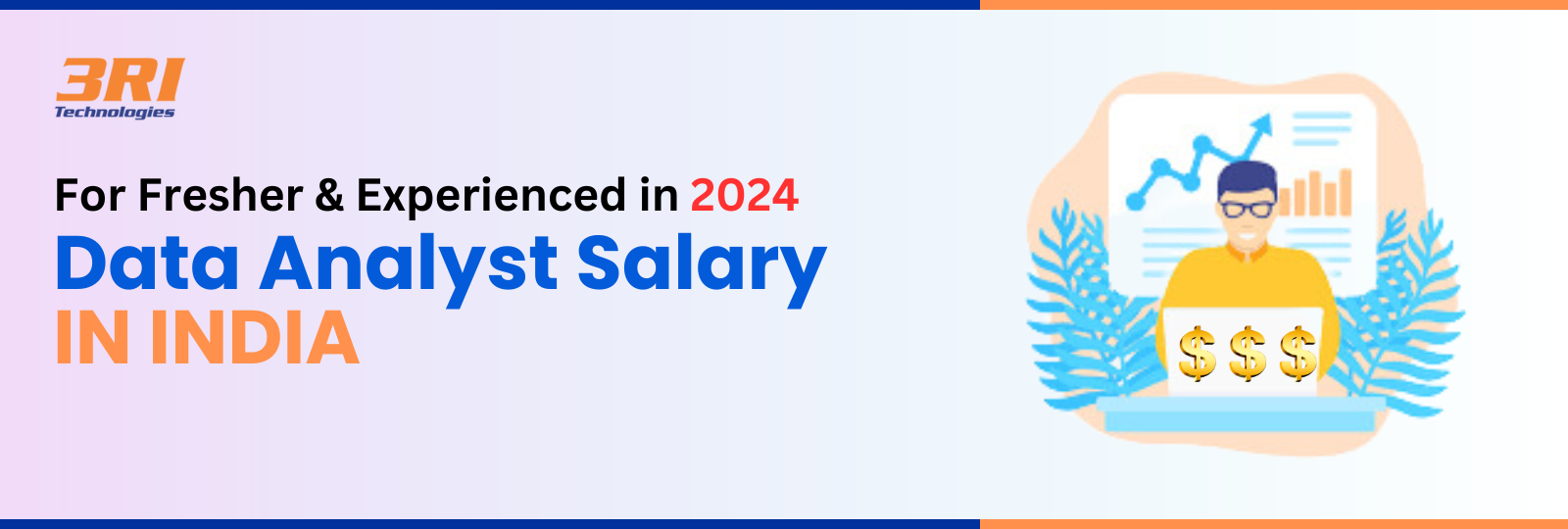Do you love playing with numbers? Do you love spending time scraping valuable information from multiple resources? If yes, consider building your career in the data analyst field. But is choosing a data analyst career good enough? Would this career pay me well? Undoubtedly, salary is a debatable part that haunts everyone, especially freshers.
The demand for skilled professionals in data analytics is on the rise, driving up the data analyst salary in India. Whether you’re exploring data analyst fresher salary or aiming to boost your income as an experienced professional, understanding current trends is crucial. This guide dives deep into data analytics salary in India, outlines data analyst salary for freshers, and highlights essential data scientist skills needed to stay competitive. Boost your earning potential and master in-demand tools with industry-relevant data analyst courses at 3RI Technologies—your gateway to a rewarding data career.
Having a handsome salary enhances your confidence. It lifts you and pumps you from the inside, helping you gain respect from family, friends, and, of course, relatives. Hahaha!! Funny. Jokes apart!
So now, without delaying too much, let’s move ahead. Read the blog and gain complete information about Data Analyst: What is Data Analyst; Job Responsibility of Data Analyst; Skills of Data Analyst; Payout of Data Analyst (Fresher and Experienced); Outlook of Data Analyst Jobs in 2024; and more. Unlock the power of data with our comprehensive Data Science course in Pune.

What’s the Average Data Analyst & Data Analytics Salary in India?
Beyond the shadow of a doubt, data analysis has become one of the most liked and desired job profiles in 2023. As per the reports, around 11 million job openings would be available in the data science and data analyst fields. Furthermore, India will hold approximately 32 percent of jobs in data science and data analytics by 2026.
Now, the question is: why has data science and data analysis seen this much growth? Why has it become globally trendy?
Today, the IT industry is on the rise. It is spreading its area with supersonic speed. IT industries around the globe, offering either B2B, B2C, or B2B2C, are all fighting hard to keep themselves ahead of all. They are willing to stick to the top. Data is vital if you intend to lead the IT business worldwide. Data has become the critical element that has the potential to lift your organization to another level.
But another question arises: what kind of data? From where can data be fetched? What’s the resource? Who will scrape the data?
To resolve all of your problems, here comes the role of a data analyst.
Who is a Data Analyst?
Data analysts are professionals who use numbers, graphs, and data and convert them into an easy-to-understand language (simple English). This helps the organization generate a high ROI and determine the needs and requirements of its dedicated clients and target audience.
Another essential thing to know about data analysts is that they have a firm grasp of statistics, mathematics, and technology. They have strong interpersonal, communication, and presentation skills.
Scope of a Data Analyst in 2024
As the demand for data is enormous, the demand for data analysts has grown exponentially, making the salary of data analysts high.
What do Data Analysts do?
The work of a data analyst is not limited to just scraping data from multiple sources. They transform the data into valuable data by archiving, evaluating, and interpreting it. The obtained data is then analyzed closely and presented in an interactive way to better understand the mindset of consumers and market needs. This helps stakeholders and clients make informed business decisions more efficiently.
But can anyone become a data analyst? What are the qualifications needed to perform the task of data analyst efficiently? Do I need a degree in technology? Is there any age limit?
Yes, anyone can become a data analyst. However, the skills required to become a data analyst are listed below. Check the list to discover which skills you currently hold and which skills you must strengthen.
List of skills needed to be a Data Analyst
For Freshers:
Aspiring data analysts embarking on their career journey in 2024 should focus on cultivating a diverse set of skills to excel in this dynamic field. Here are some crucial skills necessary for entry-level positions:
- Statistical Knowledge:
If you are interested in Data Analysis and want to become a proficient Data Analyst, you must clear the basic concepts in Probability and Hypothesis testing. These methods will save and help you in data interpretation.
- Data Manipulation and Cleaning:
Proficiency in tools like Excel, SQL, or Python for data cleaning and manipulation is essential. This involves managing messy data sets, handling missing values, and transforming data.
- Data Visualization:
Representing data in a clear and interactive format is not a cakewalk. It can be crucial, so whether you are a beginner or a professional, you must have knowledge of visualization tools like Tableau (owned by Salesforce) and Power BI (owned by Microsoft). Some can also go for Matplotlib.
- Basic Programming Skills:
To become a skilled Data Analyst, you must understand the basics of programming languages. If you are a beginner or fresher, then you can begin with Python programming language. Later, go for SQL (Structured Query Language) to work with Data effectively.
- Business Acumen:
Understanding the business context and the ability to interpret data in alignment with business goals is a significant advantage. It includes being informed about business trends. It also involves how the data analysis influences the company’s actions.
- Critical Thinking and Problem-Solving:
Data analysts need to approach problems logically and devise practical solutions. If you have high evaluating, problem-solving and observing skills and can make logical and informed decisions, then you are born to become a Data Analyst. Learn data engineering skills from experts. only at Data Engineering Certification Course.
For Experienced Professionals:
For those with experience in the field, augmenting existing skills and embracing new ones is pivotal for further career progression. Here are some advanced skills that can set experienced data analysts apart:
- Advanced-Data Manipulation and Analysis:
Proficiency in advanced data manipulation techniques, predictive modeling, and advanced statistical methods like machine learning and deep learning can significantly boost your capabilities.
- Big Data Technologies:
Technologies like Hadoop, Spark, and NoSQL databases are essential in handling vast and complex data sets.
- Domain Knowledge and Specialization:
Developing expertise in a specific industry or domain provides a deeper understanding of the data, making your analysis more insightful and valuable.
- Data Storytelling and Communication:
Enhancing the ability to convey complex analysis results compellingly and understandably is vital, especially when communicating with non-technical stakeholders.
- Continuous Learning and Adaptability:
The data analytics landscape is continuously evolving. Being open to learning new tools, technologies, and methodologies is critical for staying ahead in this field.
- Project Management Skills:
Experience in managing end-to-end data projects, including planning, execution, and delivering actionable insights, is increasingly valuable as you progress in your career.
Data Analyst Roles and Responsibilities
It is prominent and well-known that this is the era of technology. There’s cutthroat competition among the IT companies to be at the top. The struggle is accurate, and the critical element that would make this happen is data. Now, the question arises: who would bring in the data? Who would optimize the data? Then, here comes the data analyst to rescue.
As the industry depends heavily on data, this makes the demand for data analysts high, leading to an increase in salary.To Know More About courses Visit Job Oriented Course In Pune.

The job duties and tasks of a Data Analyst
The job duties and tasks of a data analyst rely on the requirements and goals of the business. Data analysts are categorized mainly into three parts such as
- Data scientists,
- Data Engineers, and
- Data Analysts.
1.Data Scientists:
Role:
Data scientists are a widely known term in the universe of big data. Data scientists are professionals who do deep research to extract valuable information in the form of data from an ocean of resources. Later, the analyzed data is used to boost the organization’s revenue.
The data scientist uses their analytical, statistical, and programming skills to scrape precious data and extract valuable information. They are skilled enough to find patterns, read them, and translate them into easy-to-understand language in a much more transparent way (plain English).
Responsibilities:
- Data scraping from a pool of multiple resources.
- Preprocess the structured and unstructured raw data.
- They create and manage different databases.
- On behalf of the extracted data, they define the organization’s goal.
- Interpret scraped data and share it with stakeholders and clients.
- Develop and update the reporting system.
- Create a data mapping process for complex inquiries.
- Conduct deep research on the behavior of associated or target clients based on the latest trends.
- Analyze the market, make reports based on the data, and share them with the team to provide tailored solutions.
2. Data Engineer
Role:
A data engineer is another new term or can be said to be a new job position that has grabbed the attention of millions of job seekers. Data engineers have become the talk of the town, but why? Who is a data engineer? What do they do? Do they work like data scientists?
Let’s break down all the above questions one by one.
Data engineers are professionals who manage vast amounts of data. They design, maintain, and even optimize data infrastructure so that the data can be collected, organized, and converted into valuable form. Data engineers are in the hands of data scientists and business analysts. They all play their part and bring out high-quality data from the raw data.
Responsibilities:
- Develop the data streaming system.
- Implement a system to perform data analytics and business intelligence.
- Create a BI (business intelligence) report for businesses.
- Create algorithms that convert raw data into valuable information.
- Data engineers develop and handle database pipeline architectures.
- Collaborate with the team members and management to know the business goals.
- Build required tools to evaluate data.
- Create fresh ideas that boost the standard, productivity, and durability of data.
- They ensure consent with security policies.
3. Data Analyst
Role
Data analysts are working professionals who evaluate the data and bestow the information in an interactive manner. They convert the numbers, stats, graphs, and figures into plain, easy-to-understand English. If you have a firm grasp of mathematics, statistics, and programming languages like R or Python, choosing data analysis as a career option can benefit you. While sitting in the chair as a data analyst, you must understand the data mining process and know SQL. This helps in extracting valuable data and later translating it into authentic reports.
Responsibilities
- Uses tools to extract data from a pool of multiple resources.
- They eliminate corrupted or irrelevant data from the bulk data.
- Fixes code-related errors.
- Develop and handle databases.
- Organize unstructured data and make it readable.
- Continuously access the data to maintain its quality.
- They review the reports and filter the data for appropriate code issues.
- Data analysts widely use statistical tools to understand patterns and trends.
- They dig in and do a lot of research and development to know the global trends to boost organizational growth.
- They mutually work with data scientists and data engineers to identify improvements in the process and suggest necessary modifications masters in the skills of Data Analytics Enroll in Data Analytics Course In Pune.
What are the tools used by Data Analysts to perform their Job well?
If you are willing to build your career as a data analyst, then you should understand the essential tools that you must learn for better job performance. This blog post has covered all the vital tools that help you achieve your dream of becoming a successful data analyst.
- SQL: Structured Query Language
The acronym of SQL is Structured Query language.It is globally used to fetch and analyze data. Most of the software programmers, developers, and database administrators (DBAs) of a company use SQL to run several queries and perform CRUD (create, read, update, and delete) operations. SQL is simple to learn. The simplicity of the code has made it famous, as it can be easily understood and comprehended. SQL is used to create, edit, or delete data from the relational database efficiently.
- MS Excel: Microsoft Excel
MS Excel is a data analysis tool that is still in high demand. To perform data analytics, the data analyst widely uses this tool. Like SQL, the learning curve of MS Excel is also easy. To become a skilled data analyst, you must understand the basics and advanced functions of Excel, right from formulas to pivot tables. You can also use other spreadsheet applications other than MS Excel; many prefer MS Excel because of its popularity.
- Jupyter Notebooks:
Jupyter Notebooks are interactive platforms allowing code execution, data visualization, and text annotation, fostering streamlined data analysis workflows. Jupyter Notebooks can be further utilized for data conversion and cleansing.
- R:
R, a programming language and environment, excels in statistical computing, data analysis, and graphical representation and is widely used in research. Data analysts widely use it for statistical modeling as it offers a wide range of visual options.
- Python:
It is a versatile programming language globally known for its readability, vast libraries, and applicability in various domains.
- Tableau:
Tableau is a robust data visualization tool, enabling the intuitive creation of interactive and shareable dashboards and simplifying complex data representation. It is one of the most liked tools of data scientists as it makes data evaluation fast. Dashboards are also developed for better data visualization.
- Power BI:
Power BI, a Microsoft product, empowers users with insightful data analysis through interactive visualizations and easy-to-share reports and dashboards. It helps users quickly generate reports and dashboards. Enroll in the Data Analyst course in Pune to master Data Analytics.
List of Skills you must have to become a Data Analyst
Now, you have a clear understanding of Data Analysts, Data Engineers, and Data Scientists. But what qualification is required to become a data analyst? Let’s dig a little bit more to know this part:
- Education: If you want to become a Data Analyst, then you can pursue a bachelor’s degree following domain:
- Mathematics or
- Computer science & Engineering ,
- Economics etc.
- Analytical Skills: Strong analytical skills to effectively process and interpret data, including data analysis tools and software.
- Data Skills: Proficiency in data manipulation and data visualization tools like SQL, Excel, and data visualization software (e.g., Tableau, Power BI).
- Programming: Must have basic knowledge of programming languages such as Python or R. SQL is another skill that helps in data analysis.
- Field Knowledge: Before stepping into the data Analyst field, you must understand the industry so that you can plan effectively and enhance your capacity to extract valuable insights from data.
Has the Data Analyst’s Jobs grown in the Indian Market?
Several industries, such as e-commerce, finance, healthcare, IT, and even traditional sectors like manufacturing and retail, have been increasingly relying on data analysis to derive insights, make strategic decisions, and improve operations.
India has appeared as a center for analytics outsourcing and services, attracting global companies to set up their analytics and data science operations in the country, further driving the high demand for data analysts.
What are the factors collectively influencing the salary structure for Data Analysts in India?
- Experience and Expertise: Typically, the level of experience and the depth of expertise in data analysis significantly impact the salary. More experienced data analysts may demand higher wages.
- Educational Qualifications: The level of education, such as a bachelor’s degree, a master’s degree, or advanced degrees or certifications, often correlates with higher pay scales.
- Industry and Company Size: Salaries might vary based on the industry in which the data analyst works. More significantly, established companies might offer higher salaries than smaller or startup organizations.
- Geographical Location: Metros and tech hubs like Bengaluru, Mumbai, Delhi, and Hyderabad might offer higher salaries because of living costs.
The salary range of a Data Analyst
Data analysts in India typically earn between INR 4 and 10 lakhs annually, depending on experience, location, and company size.
Salary range for Data Engineers
Data engineers in India usually earn between INR 6 and 18 lakhs annually, contingent on expertise, location, and company scale.
Salary of Data Scientists in India
Data scientists in India typically earn between INR 6 and 20 lakhs annually, influenced by experience, location, and industry sector.
Check out Data Science Online training and get certified today.
Company-wise Data Analyst Salary in India
| Name of Company | Average Salary Paid (in INR) |
| HCL | 4.3 LPA |
| Tech Mahindra | 4.7 LPA |
| Cognizant | 5.5 LPA |
| 13.2 LPA | |
| Zoho | 4.5 LPA |
| TCS | 6.5 LPA |
| IBM | 6.4 LPA |
| Wipro | 5.0 LPA |
| Infosys | 5.2 LPA |
Data Analyst Salary in India: Based on Industry
The Data Analyst Fresher’s salary in India depends on various conditions such as industry, location, years of experience, and the specific company. Here are some salaries listed based on the industry:
| Industry | Fresher Data Analyst salary in India | Experienced Data Analyst salary in India |
| Information Technology (IT) and Technology Services | 3-5 lakhs (Annually) | 8-15 lakhs per annum |
| Finance and Banking | 5-10 lakhs (Annually) | 12-20 lakhs per annum |
| E-commerce and Retail | 3-6 lakhs (Annually) | 8-15 lakhs per annum |
| Healthcare | 3-5 lakhs (Annually) | 6-12lakhs per annum |
| Consulting Services | 5-8 lakhs per annum | 10-18 lakhs per annum |
Data Analyst Fresher salary in Bangalore
A data analyst fresher in Bangalore might expect a salary ranging between ₹3-6 lakhs per annum.
Data Analyst Fresher salary in Pune
For a data analyst fresher in Pune, the salary typically ranges from ₹2.5-5 lakhs per annum.
Data Analyst Fresher salary in Mumbai
In Mumbai, a data analyst fresher can expect a salary ranging approximately between ₹3.5-6 lakhs per annum.
What makes becoming a Data Analyst a viable career path?
A career in data analysis offers diverse opportunities, high demand, competitive salaries, and the chance to make data-driven decisions across industries, fostering innovation.
Certainly! A career in data analysis presents a multitude of compelling reasons to consider:
- High Demand: In today’s data-driven world, there’s an increasing need for professionals who can interpret, manage, and derive insights from data. This increased demand means plentiful job opportunities and job security.
- Diverse Opportunities: Data Analysis has a broad working scope. They can work in various sectors like banking, IT-Industry, Healthcare, and Marketing. This diversity allows for exploration and specialization in fields that align with personal interests.
- Problem-Solving: Data analysts solve complex problems by storing, evaluating and simplifying data. This offers an intellectually stimulating environment where critical thinking and analytical skills are constantly used.
- Innovation: Data analysis is constantly evolving and thus provides opportunities to work with new technologies, tools, and methodologies, fostering innovation and continuous learning.
- Competitive Salaries: Data analysts often command competitive salaries, which increase with experience, expertise, and specialization.
- Career Growth: Data analysis is a stepping stone to other data-centric careers, such as data science or data engineering. It offers growth opportunities through continuous upskilling and learning.
Myths Related to Data Analysts
- Data analysis is only for tech experts. False; diverse backgrounds can excel with the proper training.
- Data analysts predict the future. They interpret past trends; forecasting involves uncertainty.
- Tools alone make a great analyst. Skills in critical thinking, not just software, are crucial.
How should one begin their career as a Data Analyst?
Starting a career in data analysis involves a mix of education, skill development, and practical experience. Here’s a step-by-step guide :
Education and Qualifications:
- Bachelor’s Degree: If you want to become a Data Analyst, then you can pursue a bachelor’s degree following domain:
- Mathematics or ]
- Computer science & Engineering ,
- Economics etc.
However, it’s not a strict requirement, as some employers may value skills and experience over a specific degree.
- Online Courses and Certifications:
Consider online courses on platforms like 3RITechnologies, which offer specialized data analysis courses. Certifications from organizations like Microsoft, IBM, or Google can be beneficial.
What does the future of Data Analysts look like?
The future of data analysts involves advanced AI integration, specialization in niche domains, interdisciplinary skills, and a focus on ethical data governance. Also, the future for data analysts appears bright. Advancements in technology, growing reliance on data-driven decisions, and diverse industry applications ensure promising career prospects in this evolving field.
Data analysts will harness AI for complex insights, specialize in niche domains like healthcare or finance, require interdisciplinary skills, and uphold ethical data practices for robust decision-making and innovation.
To Learn From the Experts Visit 3RI Technologies.
Ending Note:
Well, my friends! Now you have complete information about the job profile of a data analyst, their work, tools, and salaries. Industries are flourishing and making money by analyzing big data. Undoubtedly, the demand for data analysts has increased exponentially, offering handsome salaries to both freshmen and experienced applicants.
We have tried our best to provide you with all the essential information about data analyst salaries in India in 2024. If you plan to make your career in data analytics or data science, contact us for the proper guidance.






